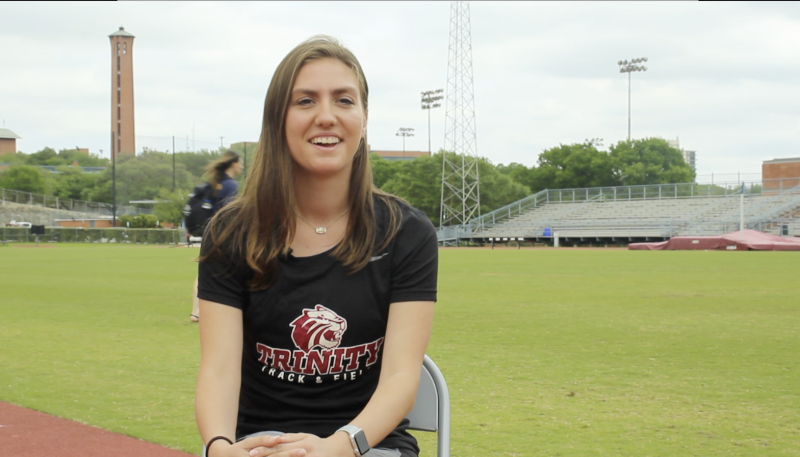Almost one year after Amanda Gerlach suffered a cartilage defect that left her unable to walk, the sophomore distance runner races once again. From the moment the starting pistol goes off, she hears her father’s advice in her head, his voice echoing until she crosses the finish line.
She is still moving forward as she turns her head back toward the crowd, which she can’t help but to scan in search of her father’s face.
“It’s hard to finish a race and look around for your dad and realize that he’s not there,” Gerlach said.
Gerlach lost her father unexpectedly last August, while Gerlach was in the middle of a painful recovery thanks to the cartilage defect, which emerged due to overuse.
“I was in shock because I had just seen my dad a couple days beforehand. I shut myself off. I didn’t go to class as much ’cause I felt weak, I felt tired,” Gerlach said. “I was retreating from all my relationships. I wasn’t eating. I wasn’t sleeping. I was struggling to pay attention in class and to connect emotionally with others.”
Over the past eight months, Gerlach’s grief has evolved.
“[Grief] was something that consumed me,” Gerlach said. “Now it’s kind of like a visitor, or like something that sticks in the back of my mind.”
Gerlach thinks about her dad every day. She wonders what he’d say about certain situations. She wishes she could show him a joke she saw, or talk to him about her recovery process.
The sorrow of loss is much like the pain in her knee — Gerlach may have conquered the hardest part of the process, but the pain will resurface at various times throughout her whole life.
“Injuries and grief, at least in my situation, [they’re] very similar in that they pop up when you least expect it,” Gerlach said. “I’m learning to use my grief in a way that propels me forward as a motivator for life. It is definitely something that I work with, and I work towards getting better at what I do and becoming a better person through this, so I can understand what other people are going through. I can be more sensitive to them and as a whole, just living life the way my dad would have wanted me to.”
On the brick walls of Gerlach’s dorm along with photos, art and other quotes hangs a decorative print that read, “It is well with my soul.” Gerlach picked out the piece weeks before her father’s death because she liked the colors, but following his passing, the words — from of a famous hymn by Horatio G. Spafford — and their meaning would later be a source of needed comfort to the grieving Gerlach.
In November 1873, Spafford was sailing to England to join his wife, who was the only one spared in a deadly shipwreck that killed the couple’s four daughters. Overlooking the expanse of open ocean where it was thought his daughters had perished days earlier, the Chicago Presbyterian penned these words:
When peace, like a river, attendeth my way,
When sorrows like sea billows roll;
Whatever my lot, thou hast taught me to say,
It is well, it is well with my soul.
Aware of the context, Gerlach often repeats the final sentence in her head to remember that even in the pain, there is, from her perspective, a peace that surpasses understanding, found through faith.
Also on her wall is the Bible verse Romans 8:28, reading, “We know that God works all things together for the good of those who love him, who are called according to his purpose.”
“It’s not saying that life is gonna be good, but God works for the good and that’s just really comforting to me,” Gerlach said. “God will support me and use me in whatever situation he wants in life.”
Gerlach, known for her sunny disposition since childhood, acknowledges that is difficult to open up about brokenness.
“I am this one person which is very positive, but I also have a lot of emotions inside me that I can’t show the rest of the world,” Gerlach said. “It’s a pressure that I have, where I have to give off this vibe like everything is OK, even when sometimes it’s not.”
Gerlach has found it is important to not walk this journey alone, finding support in many places.
“I heavily, heavily rely on my mentors like my coaches and several of the faculty here on campus,” Gerlach said. “Dean Tuttle has been a great resource for me, and Dr. Morais in the sport management department — he’s positive and so motivating, and he’s helped me in ways that he can’t even imagine.”
In a grief support group organized by Tuttle, students have found solidarity in the shared experiences of loss. In a school year that has seen two students pass, the process of mourning — in all its different forms — is something Gerlach thinks our community needs to address, despite its surrounding stigma.
“Life is, you know, it’s not perfect,” Gerlach said. “If you are sad, you’re allowed to be sad. You can have grief. You can be frustrated and deal with your problems, and if you need help, I think it’s really important to get help.”





